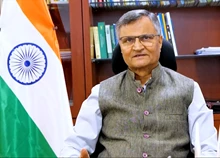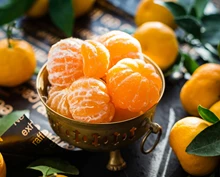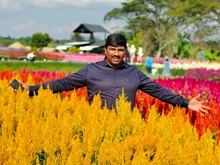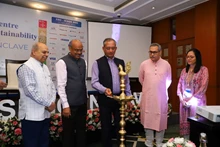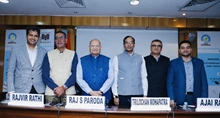
India is now among the largest producers of rice, wheat, pulses, vegetables, fruits, milk, cotton, horticultural crops, dairy, poultry, aquaculture, and spices. India's global trade in agricultural produce also fetches higher revenue for the country. Despite the impressive progress, there is no scope for complacency. It is estimated that by 2030 the Indian population would be 1.52 billion and by 2050 it would be 1.7 billion, which will be the highest in the world and would surpass China too by 400 billion.
Climate change is for real and certainly not fiction. Abiotic stresses, especially drought, heat, flooding, waterlogging, soil acidity and combinations of abiotic stresses have a huge negative impact on the rainfed crop yields. Crop losses will be most acute in areas where an increase in temperatures may lead to an increase in both population growth and metabolic rates of insects. Building Climate resilience in smallholder farming systems requires the implementation of an intensive multidisciplinary and multi-institutional strategy.
Dr. B. M Prasanna presented Maize as a case study. He spoke on Aligning breeding and Molecular Approaches to increase genetic gain for Climate Resilient Traits. He emphasized in Building Resilience in Farming Communities to climate Induced Risks.

DNA based markers to evaluate DUS criteria of Plant varieties -prospects and challenges by Elmar Weismann emphasized on UPOV to focus on the approach of DNA based markers because this might be useful for the examination of phenotypic characteristics that cannot be consistently seen in the field or which require additional special procedures (disease resistance). He also spoke on DNA based markers to be fully predictive of the expressions of the phenotypic DUS characteristics. He also dealt with many challenges and prospects.
Dr. Patrik Stolt spoke on the Use of Molecular markers in Crop Breeding and Variety Identification. He spoke on meeting better Sustainability and End Consumer demands by using the economic power of Molecular Markers combined with Machine learning and Artificial Intelligence. The industry should support the socio-economic growth of smallholder farmers. He explained on the collaborating model with different stakeholders, which INTERTEK did as a CSR which they developed for the SDG 17, Partnerships for Goal and explained this model that helped farmers in Africa. He also reiterated the importance of using these approaches in India too.
Dr. B. M. Prasanna explains that Scientific Institutions must enhance the pace, precision and efficiency of breeding programs through judicious and effective integration of tools and strategies, including high-density phenotyping, speed breeding, molecular marker-assisted and genomic selection based breeding and knowledge -led decision support system. He also reiterated on understanding the smallholder farmers' constraints for adoption of modern technologies enhancing affordability and access to quality agricultural inputs and improving their linkages to the input and output markers should be accorded top priority.
Seed systems needing to be further strengthened says Dr. B. M. Prasanna to become more market-oriented and dynamic and for providing smallholders with greater access to agricultural inputs and improving markets. Furthermore, he emphasized the efficiency and effectiveness of the breeding programs that should be monitored by employing metrics designed to measure the impacts of breeding outcomes.






